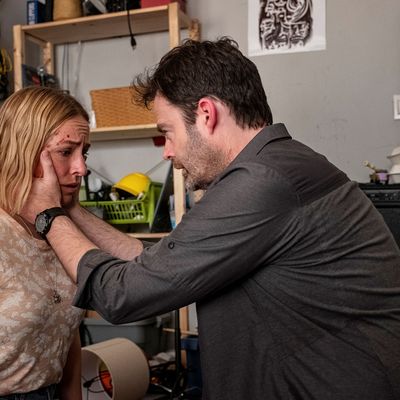
It’s rare that you get That Feeling watching a TV show. That old-fashioned feeling that reminds you of when you were first getting into TV: staring at the screen, wide-eyed, heart pounding, fully engaged, not noticing the run time, knowing in the back of your mind that you’re seeing something special. I remember Locke opening the hatch in the first-season finale of Lost, Jesse shooting Gale and Hank reading Leaves of Grass on the toilet in Breaking Bad, and the garage scene and crying to “With or Without You” in the finale of The Americans. And I’ll remember watching “Starting Now,” the best episode of the best season of one of the best shows on TV.
It’s essentially a perfect 30 minutes: heart-stopping in scene after scene and consistently hitting that groove of surprising yet inevitable. And what might be most impressive is how efficient it is, leaving so many open possibilities for season four but also setting up the next phase of this story with ease.
Barry’s story is told in three acts this episode, and fittingly, each act centers on his relationship with a character he hasn’t spoken to in a while. First, he ditches the hospital and returns to home base at Nick and Jermaine’s place. But Sally’s already there, following up on Barry’s earlier offer to mindfuck and gaslight Diane Villa — only she wants him to mess with Natalie instead. She’s in a dark place, and like Fuches, all she can think about is revenge. But all those plans go out the window when a much more serious problem presents itself in the form of Shane Taylor, the biker-gang member who survived “710N.”
This scene represents Sally’s first real crossover into the crime-world half of the series, and it’s not just Shane’s sudden attack; it’s her desire to be like Barry, to indulge her rage and inflict pain on another person. But after Barry’s brush with death, he doesn’t want any company on the dark side. “I know where I’m going after all this,” he tells an oblivious, single-minded Sally. “I don’t want you to go to the same place.”
As a plot device, Shane becomes a handy outlet for Sally to release her not-so-pent-up anger under the guise of self-defense. I’m not sure Sally murdering somebody would’ve been believable before this moment, and even in this scene, it’s the specific context that makes it work: This man is choking her, like her abusive ex-husband did, like she asked her boyfriend to do to her in acting class, like she asked stuntpeople to re-create on the set of Joplin. There’s something about that act that feels particularly visceral and nightmarishly familiar. That’s the sensation that’s fresh in her mind when she reaches for a baseball bat (off-screen) and beats Shane down, screaming and swearing as she does it. He’s no longer just Shane; he’s also Sam, and, unfortunately, he’s probably also Natalie and Diane and anyone who Sally thinks ever wronged her.
This is one of the rare circumstances where Barry has utility as a partner, in a way, and he immediately takes control. It’s the last time we see Sally except for one scene a bit later, when Barry tells her he loves her over the phone and she quickly returns it before boarding a plane back home to Missouri. This has been a rough season for Sally, and in many ways she’s become a monster. But I still care about her and hope she can avoid sinking to the depths of the evilest characters on the show.
The next act of Barry’s story features a confrontation with his old buddy Albert, who finds him burying Shane at the same remote mountain spot from the opening scene of this season. It’s a significant parallel: Barry reacted angrily to a client forgiving the man he’d hired him to kill in that scene. “There’s no forgiving Jeff!” he’d shouted because it seemed like there was no forgiving Barry. Barry has been in half-hearted pursuit of forgiveness since.
Albert serves two purposes here. In a literal sense, he’s an old friend, a credible choice to both take Barry to task and to offer him unexpected grace, if not forgiveness. It’s a powerfully human moment when he admits that if Barry hadn’t saved his life, his daughter Elsie wouldn’t exist. But Albert is also framed as a messianic figure as he stands over Barry’s kneeling body as he weeps and screams, completely spent, guilty, and sick of himself. With the sun on his face, Albert hands down his final, merciful judgment: “I know evil, Barry, and you’re not evil. But this has to stop. You hear me? Starting now.” Albert may be genuinely offering him a second chance nobody else would be lucky enough to get, but for all the Judeo-Christian imagery, we know it’s bullshit.
This season hasn’t been about Barry finally becoming deserving of a second chance that sticks. It’s been about him receiving them, over and over, and slowly becoming aware that this has been happening for years. But like Fuches repeatedly rejecting peaceful lives with beautiful women and Sally steering into her worst qualities in a misguided attempt to take control of her narrative, Barry has never accepted these opportunities to do better. His instinct for self-preservation, and his ongoing belief that his choices are uniquely justified, have only pushed him further and further past the moral event horizon. There’s no going back now.
That becomes clear in the episode’s final act, which brings the story back to Barry and Gene. In a powerful one-shot sequence, Jim Moss follows up his softball interrogation from the last episode with a full-court press, sitting opposite Gene in an empty garage and forcing him to do the right thing: tell the truth about Janice’s murder.
So Gene calls Barry from outside Jim’s house and, acting from the heart in a way he never has, pretends he’s desperate enough to kill the man. The crucial phrasing here, once Barry arrives fresh off some desert absolution, is when Gene says, “He knows everything, Barry. He knows you killed Janice.” He’s luring Barry back to the dark side, but it’s a place Barry never really left. Barry may have faced his demons head-on this season, but he’s still not a good person, and there’s no way he could allow his true self to become public knowledge.
Of course, he inevitably ensures that very ending when he chooses to save Gene (another twisted act of love) by entering Jim’s house and pointing a gun at his head. (You can practically hear him gearing up for his millionth “starting … now.”) The cops swarm in, the repeated bellows of “Berkman, drop the fucking gun!” conveying the startling realness of this moment. When Barry looks over at Gene in pain and disbelief, he sees the catharsis that Gene has been chasing all season.
The only story during this episode that doesn’t concern Barry is Hank’s, who’s still cuffed to a radiator, waiting for his buddies to break free and help him. But when the guards come in and unleash some kind of terrifying animal, a violent scuffle follows, and two of Hank’s only remaining buddies get killed. Since we see the scene from Hank’s point of view, we’re denied any glimpse of the carnage, which makes for a delightfully strange mix of heart-racing fear and laugh-out-loud comedy at the deranged off-screen chaos. As blood and vomit seep through the cracks into the room and the wall starts to collapse, Hank manages to pull the handcuffs off the wall and fend off the guard who rushes in. The following escape features the first time we’ve seen Hank directly kill anybody.
As far as first kills go, Cristobal’s wife Elena is a pretty good candidate. The scene Hank walks into is a complete horror show: Elena is putting her husband through electric shock conversion therapy, forcing his mind to associate the sight of a hot male dancer with pain. She also makes a pathetic and disturbing attempt to force his attraction to her, but of course it keeps failing; the man is frozen, exhausted, and clearly traumatized. When Elena and the dancer suddenly drop and Hank materializes before his eyes to delicately embrace him, Cristobal’s small smile shows a measure of relief. But it’s not a promise of a happy ending. Nobody is forgetting what happened here.
Hank may not have gotten a ton of screen time in season three, but what he did get had some of my favorite material for the character yet. This year took a nice-guy mobster and put him in a riff on Romeo and Juliet, transforming him from a comic-relief figure into a character worthy of his own love story. The final images he sees before saving the love of his life are probably the darkest we’ve ever seen in a Hank scene; there’s very little dark humor here, only horror.
That’s just another example of this show’s versatility. Season three was Barry’s best yet, a thoughtfully told story about different people searching for forgiveness and rarely finding it. At every point, these eight episodes spotlight the webs of collateral damage that branch out from every act of violence, whether a shot to the head, a slap to the face, or a belittling scream. Sometimes redemption is within reach, but sometimes remorse, whether in the form of a verbal apology or a generous donation, isn’t enough. Sometimes consequences, whether that means incarceration or something as permanent as death, aren’t enough either.
Bullet Points
• It goes without saying that Bill Hader’s direction in this finale, as with every episode he directed this season, is incredible. Sure, there are flashy moments that make you go, “cool!” But more importantly, every shot tells a story, packing each episode with emotional information that allows it to accomplish so much in 30 minutes. Bring on the all-Hader-directed season four.
• Bob Jacobson wants to put on a live production, televising the auditions of Gene and Annie’s students, before eventually screening it in theaters. Gene suggests Annie’s experimental play Chromefuck Number 9, so … look for that next season?
• The LAPD has enough to nail Fuches for working with the mob, so he’s off to jail, where he actually self-identifies as the Raven, the silly moniker Hank gave him. I expect this to mean Barry and Fuches will reunite in jail next season, which sounds fun.
• I’m bad at identifying animal roars — is that a lion? A tiger? A bear? The monster from Annihilation?
• Is Batir still alive? I think the last time we saw him was his FaceTime call during the plant-shop raid, and it would make sense to leave one of Hank’s friends alive.
• I’m a little surprised Elsie Fisher’s Katie didn’t return at all after the Joplin premiere, but she killed it this season.
• I’ve always loved this show, but I did not quite know what I was getting into when I took this assignment. But it’s been so rewarding. Thanks so much for reading and commenting along!


